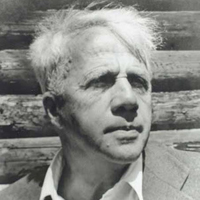The Gift Outright by Robert Frost: Summary and Analysis
The Gift Outright is a patriotic poem. This poem was composed in 1936 and published in 1941, a few months later the United States entered World War II. This poem had already achieved a level of familiarity and recognition among the people, but it received special attention when Frost recited it at the inauguration of President John F. Kennedy on January 20, 1961.

Robert Frost (1874-1963)
In the beginning, this short poem makes a reference to the history of colonization. America was already in existence much before the people who constituted the modern American nation went there and settled down finally. It took them about one hundred years or more to own the country entirely as their own motherland. Massachusetts, Virginia, etc. were already in existence before the land was colonized. But the people were being governed by the British. Although as colonials the ancestors of America possessed the land, they were not possessed by a sense of 'belonging' to it. These colonials were holding back something, i.e., love and devotion, which rendered them weak until they found that they themselves were not coming forth with patriotism, sincerity and, love for the country they were living in. Immediately, they saw safety in surrendering themselves for the cause of the country. They gave themselves thoroughly (The result of their surrender was many physical combats with Europe, esp. Britain) to the country which had just begun to identify itself with the western world. But on the whole, it was still mysterious, fresh and agrarian, as it would appear in the future too.
This poem is deeply patriotic. It is one of the best patriotic poems ever written about America and American people. For its deep love of the land, John F. Kennedy was drawn to it. Frost was the special invitee to read this good, great poem, though short in size, at his Inauguration. The greatest quality about this poem is that it expresses much in a short compass. It does not become lavish in praise of the country; in the fewest words, poetic indeed as it is, Frost succeeds in raising the poem to the stature of a national anthem. Here's a poem reading, which every American heart will be glad and every American bosom will be swollen with pride. The very beginning sets the tone of the poem:
The land was ours, we were the land's.
And then,
She was our land more than a hundred years, Before we were her people.
The poem takes an unexpected turn in the serious tone in the thirteenth line: “(The deed of gift was many deeds of war.)” All of a sudden, the speaker mentions the revolutionary wars and the great martyrs who happily died for the sake of the country. The speaker regrets that the war for the land caused so many human casualties. The use of the parentheses in this particular line focuses on the fact that the war and the sacrifices many people gave should not be forgotten.
The great ideal of love of the nation and of selfless devotion to the motherland has been expressed in this poem. Robert Frost also considered highly of this poem and said, "It's the whole story. It's all my politics, my national history.” It is not a political propaganda. It is a poem first and political propaganda or anything else later.
The poem will ever be read by the Americans as a grand expression of their high sense of national prestige and also by the international community as a source of perennial inspiration to strive towards the achievement of freedom of all kinds.
Cite this Page!
Shrestha, Roma. "The Gift Outright by Robert Frost: Summary and Analysis." BachelorandMaster, 31 Oct. 2017, bachelorandmaster.com/britishandamericanpoetry/the-gift-outright-summary-analysist.html.
Related Topics
The Silken Tent: Summary and Analysis
The Death of the Hired Man: Summary and Analysis
Neither Out Far nor In Deep: Summary and Analysis
West Running Brook: Summary and Analysis
Stopping by Woods on a Snowy Evening: Analysis
A Considerable Speck: Critical Analysis
Mending Wall: Summary and Analysis
Home Burial: Summary and Analysis
After Apple Picking: Summary and Analysis
The Road Not Taken: Summary and Analysis
Fire and Ice: Summary and Analysis
Nothing Gold Can Stay: Summary and Analysis
Acquainted with the Night: Summary and Analysis
 |
bachelorandmaster.com |